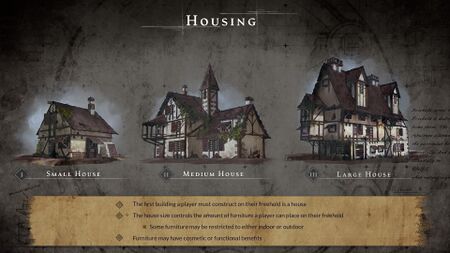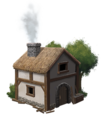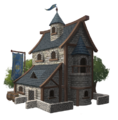Freeholds
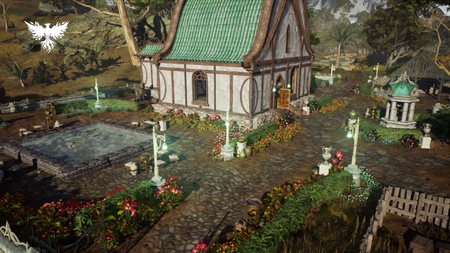
Three main purposes that freeholds provide are allowing players an opportunity to express themselves in a highly customizable fashion. So these are plots of lands that you have access to. You can build different types of buildings on. You can create housing and place furniture; and you can grow livestock and you can just own this piece of land. And one unique thing about allowing the players express themselves through this manner in Ashes of Creation is that it's in the open-world, so it's not an instance or a phase location that you are customizing. You're actually leaving a mark on the world that's representative of you as a player, as a character. Something you can you can roleplay. But importantly enough, when it comes to the economy, freeholds also provide the highest level of processing that's available; and processing is one of three primary branches that exist within the artisanship system. Processing is the intermediary step between what you gather in the wild and what you eventually craft via recipes. The the other primary purpose of freeholds is that they allow you to offer certain types of business services, because we don't just want to make freeholds delegated to the individual owner. We want it to have capabilities to interact with other players as they're walking past your freehold- as they're going to these hunting grounds and participating in quests or events that might be existing around; and that means that location matters for the freehold, because it's important to the business.[2] – Steven Sharif
We got some sheep; we got some cows and pigs; and we got some chickens back there; and we have a lot of space for different farmables. So we have a wheat here, corn, and then tomatoes over there as well.[3] – John Collins
Freeholds are sizable player housing plots that can be situated in baronies within the Zone of influence (ZOI) of a Village (stage 3) or higher node, including the ZOI of any of its vassal nodes.[4][5][6][7][8][9][10][11]
- Freehold estates may be purchased from other players,[12] or can be obtained via deeds from completing a quest and winning an auction.[4][5][6][13][7][8][14][10]
- Freehold ownership, whether purchased from players or via a freehold auction, requires the purchaser to have completed a freehold quest, which has a level requirement of 50.[15][16][4][17]
- The seller decides if their freehold should be auctioned or sold directly to other players.[18]
- Some freehold auctions will require node-type-specific bound currencies, others will auction for gold.[19][20][21] This is intended to cater to players with different playstyles, who are progressing through alternate systems.[19][21]
- The idea is that we're not reserving freeholds for the top 10 percent of levelers, we're reserving freeholds for the top 10 percent across the multiple different play paths that exist within the game; and this spreads out that ownership across different playstyles.[19] – Steven Sharif
- Housing takes several forms in the world of Verra. However, Freeholds are the highest tier of player housing available. Acquiring a Freehold is a major accomplishment, and it will take a large amount of effort and strategy to get a Freehold of your own. Since there is a limited amount of space available to place Freeholds in each node’s region, these are symbols of prestige for those who are able to acquire and maintain their Freeholds.[4]
- Freeholds are approximately 1.5 acres in size, or roughly 100m x 60m.[5]
- The footprint of a freehold does not change with node progression.[23]
- Previously it was stated that freeholds were half an acre in size.[24]
- The developers are expecting the number of freehold plots on each server to be in "the low thousands" depending on world state.[4][25][26][27]
- The number of Freeholds on a server will vary on a number of factors, such as how player actions advance nodes. At the moment we are targeting the low thousands for Freeholds on a server, but as we continue to test these systems during Alpha Two, we anticipate making adjustments.[4]
- Freeholds are subject to node taxes.[28]
- Freehold tax is calculated based on the number of permits issued for buildings on a freehold.[28]
- Freehold buildings that require permits will have additional upkeep costs.[4]
- Blueprints are required for the construction of the freehold buildings that are used to process resources into crafting materials.[29][30][31][32][33]
- The best processing can only be carried out on freeholds, so obtaining a freehold will require a large amount of effort.[34]
- If a player wants to achieve a freehold they can achieve the freehold, however the amount of effort resources and time that's required in order to achieve that freehold is a large amount. It is something that is a monumental achievement for you to to get that freehold; and the reason why is because freeholds tie in very heavily to the processing artisanship aspect. Some processing can be done in nodes, but the best processing is done on freeholds; and we want to make sure that there's a little bit of a throttle or gate on the amount of effort that's necessary to achieve that influence over the processing market.[34] – Steven Sharif
- Inns and other player housing options are available that are easier to obtain for players who do not need the benefits of a freehold.[29]
- Just because the freehold is very difficult to attain doesn't mean that you don't have a space for housing and furniture that you can achieve through our apartment system or an inn or the static in-node housing. Those are alternate methods as well but they do not have that aspect of the best processing is done on the freehold.[29] – Steven Sharif
- Freeholds are intended to work with the family system.[35]
- The spread of corruption in the world does not impact the freehold system.[37]
- Players are not able to adjust the terrain of their freeholds. Sloped terrain will result in stilts beneath placeable structures (to keep them level).[38]
- Expansions and upgrades become available as node progression allows.[24]
Freehold placement
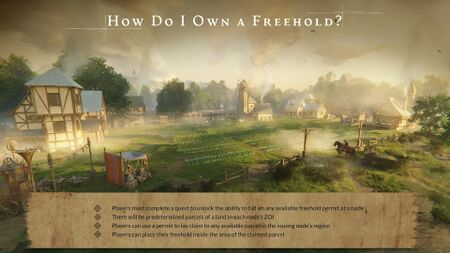
There'll be a variety of predetermined parcels of land in each node's zone of influence; and once players acquire their freehold permit they'll be able to lay claim to any available parcel in the issuing node's region so- and by region we mean... the total combined territory of a node and all of its vassal nodes. So, if you acquire a freehold permit in the metropolis of a huge region, almost 20% of the map, you'll be able to lay a claim to an available parcel anywhere within that region. So it gives you a lot of freedom if you're able to acquire the permit from a metropolis.[6] – John Collins
Freehold plots require a bound deed (permit/certificate) from the parent Village (stage 3) or higher node in order to place the plot.[4][13][7][8][14][10]
- Freehold deeds are obtained through completion of a Lord's quest to ascertain worthiness for lordship over an estate.[39][6][13][7][8][14][10]
- That was for a time a lively debate on our design team about whether or not there should be a level gate essentially from even preventing the potential for ownership. The reason why I chose to keep it at level 50 for now is because there are alternate systems that provide access at lower levels through permission setting. So it's one thing to own the home, it's is another thing to access the contents and to continue progression. Let's say, in the processing profession, you might want to gain mastery in: that mastery process leaves the nodes at around level 30 in the leveling experience for a processing profession; and so one of the debates on the design team was whether or not we should reduce the level requirement down to level 30 so that there's a seamless transition from node-based processing progression and the Freehold capability of progression.[15] – Steven Sharif
- Deeds may only be used to place a freehold if the deed holder successfully wins a freehold auction for an estate.[4][41]
- You're going to see a little bit of change and this is one of the first ones: that these are predetermined locations that exist around the node or under its vassal structure that you will have the ability to bid on; and to give you a sense there, this allows us to customize a bit of those predetermined parcels, like a Sherwood Forest type of example.[6] – Steven Sharif
- A deed holder who has won an estate auction may then claim the estate from within a barony in that node's ZOI, including the ZOI of any of its vassal nodes. Placement of the plot is enabled by using the deed item in a player's inventory to get a top-down view of the estate, then selecting the desired location for the plot.[4][41]
- It'll basically be an item in your bag; and once you get to your parcel, you claim that piece of land and then once it's claimed you'll be able to use the item to go into top-down view and layout actually exactly where your freehold will go on that parcel of land. You'll have a lot of freedom, so a lot that will be going through looking at your whole area of land you now own claim to and then deciding where the best spot to put your freehold in there would be.[41] – Kory Rice
- Freehold plots must not be placed in close proximity to any of the following:[4][45][5][41][6][7][8][9][10]
- Collections of freeholds placed in close proximity are still considered part of their parent node and do not become a separate node, other than via roleplay.[53]
- Adjacent freeholds do not share any bonuses with their neighbors, but guild halls owned by partron guilds may confer benefits to surrounding freeholds.[54][49]
Baronies
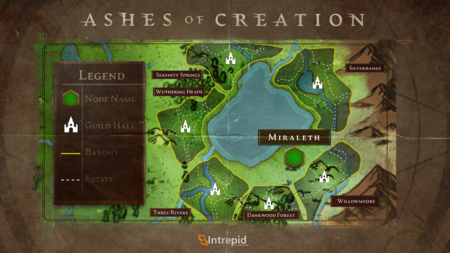
In the region around each node, there are parcels of land that are reserved specifically for the Freehold and Guildhall systems which we call Baronies. A Barony is a predetermined area of land near a node, or in that node’s vassal structure. It can be helpful to think about these Baronies as counties where many Freeholds will be placed. These Baronies may contain a single Guildhall which are similar to Freeholds, but may only be obtained by Guilds. Within each Barony, several Estates exist that may be bid on by individual players. After you’ve successfully bid on an Estate, your Freehold Deed will be available to place within the boundary of the successfully purchased Estate. Once the Deed has been placed, this will start your Freehold, and gives you access to the shed. Bringing materials to your Freehold can be stored in your shed as you prepare to build your home and other buildings.[4]
Baronies are large designated swaths of land in the ZOI of a Village (stage 3) or above node, including the ZOI of any of its vassal nodes.[4][45][5][6][7][8]
- Baronies contain parcels of land, called estates, that are reserved specifically for the freehold and guild hall systems.[4]
- A barony can only have a single guild hall.[4] The number of baronies that can have an active guild hall is determined by the node's stage.[55][56]
- Guild halls are not able to impose any taxes on freeholds within a barony.[57]
- Guild halls owned by partron guilds may have the ability to confer benefits to surrounding estates by speccing into passives in their guild skill tree and carrying out a lengthy quest line.[54]
- Each zone of influence in the world has designated large swaths of land that act as these parcels that can be catered to specific points of interest or thematically relevant; and you might want to bid on that almost county-sized area, where you then get to place your freehold. And once you have bid on that area at the node, then you can acquire the freehold plot and you go out into that zone- that section that you have bid on and acquired, and you place your freehold footprint, which previously we had set the freehold size to about a half an acre; however recently that's changed, well not recently a while ago that changed, to be one and a half acres or roughly 100 by 60.[5] – Steven Sharif
- Players obtain freehold deeds by completing a quest then winning a freehold auction at the parent node. These deeds enable the player to claim a freehold plot in a specific estate.[4][5][6][13][7][8][14][10]
- Imagine the parcel as more like a county that exists around the node; and so if you have a node in the center and you have its zone of influence around it, that's a mass group of land. And then, if you were to take a county line marker and create counties around essentially the node, that is what you would be bidding on. And then once you've achieved the parcel's certificate for that county, then you go out with your... footprint of your freehold, and you get to place the freehold within that county wherever you want- that's not obstructed by some other, road, or POI, or very large feature terrain.[45] – Steven Sharif
- Placement of the freehold plot is enabled by using an unplaced freehold deed item from the player's inventory to get a top-down view of the estate, then selecting the desired location for the plot.[4][41]
- There is a minimum distance between Baronies in addition to the minimum distance between freehold plots.[49]
- Baronies don't impose any appearance restrictions on freehold buildings.[58]
Freehold auctions
A node's freehold estates (parcels of land) become available to be bid for at auction on a regular cadence.[4][59]
- Bidding on an Estate is done through an auction system. Nodes have a limited number of Freehold Deeds available based on that node’s level. A player may only bid on an Estate if they own an unplaced Freehold Deed. Once you have successfully acquired your Estate, the next step is choosing a location within that Estate to lay down your Freehold Deed’s footprint.[4]
- Some estates will require node-type-specific bound currencies, others will auction for gold.[19][20][21]
- This is intended to cater to players with different playstyles, who are progressing through alternate systems.[19][21]
- Node-type-specific currencies will be tested during Alpha-2.[21]
- The most common denominator of availability for freeholds through the auction is going to be through gold. However, there will be a sub select of freehold options that are available in each node, based on the node type, that will correspond to one of those bound currencies in addition to gold. So what we do there is we spread out the availability of freeholds to different playstyles and different focuses so the player that might rush to level 50- they might have an advantage when bidding on gold-based freeholds, but they may not have the advantage of the Favor player or the Honor player, who is going to be progressing within those playstyles.[19] – Steven Sharif
- The cadence of freehold auctions is system-driven and can't be affected by mayors or other players.[60]
- Estates will also be recycled as a result of node sieges and atrophy.[59]
- The intent of the auction system is to provide players a non-land rush type system. Auctions will be held for each parcel that allows families to pool together their resources to acquire a deed, and gives some prep time to individuals to prepare their resources to bid as well.[61] – Steven Sharif
Freehold benefits
Freeholds offer the following benefits in addition to other player housing benefits.[7]
- The larger the homestead, the more floors it will have and the more furniture can be placed on the freehold.[4][7]
- Certain furniture may only be able to be placed outside.[7]
- Freehold businesses allow the freehold owner (and authorized individuals) to sell items, consumables and services to players.[62][7][63]
- Freeholds are the only place that master and grandmaster processing is available.[64][7]
- Players can craft up to journeyman level on freeholds.[64][7]
- Lower tier gathering can be done on freehold plots.[65]
Freehold buildings
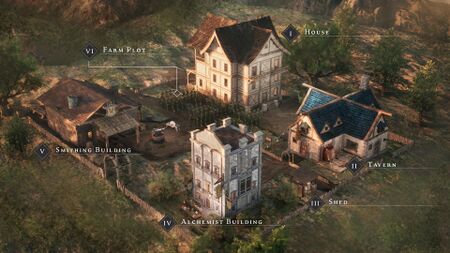
After you build your house, you can build other buildings on your Freehold. Each building needs the blueprint to start the process. If you have a cosmetic skin you want to use on a building, this is used after placing the blueprint. Once this has been placed, the building will be shown in a non-functional, construction state. Players will need to provide the required materials needed to complete the building construction, for each building on their Freehold. No Freehold has room for every possible option, so players will need to choose how to develop their Freehold by choosing to build specific artisan buildings, business buildings, and creating room for livestock and crops.[4]
Freehold buildings that can be placed on a freehold plot serve three main purposes.[4][7][67][11][68]
Freehold buildings require blueprints and materials to construct.[4][14]
- Sheds are present on empty freehold plots to provide storage for materials needed to construct freehold buildings.[44]
- Some freehold buildings have multiple tiers, with different footprint sizes.[7][23]
- Upgrading a tier will not change the size of the building in terms of footprint, but may increase in height.[23]
- Basements in freehold buildings are to be decided.[70]
Freehold taxes are calculated based on the number of permits issued for buildings on a freehold.[4][71][72][28][73]
- Buildings that require permits will have additional upkeep costs.[4]
Freehold building architecture is based on the blueprint for the building.[7][74]
- Freehold skins are applied to blueprints matching the type of building: housing, artisanship, and business.[4][7][75][76][74][77]
- The freehold building blueprints must be obtained in-game first before the cosmetic can be applied.[74][77][76]
- Players are not locked to the racial appearance of a freehold building blueprint.[78]
- The way we look at it is the freehold is your space so we want you to be able to make it look the way you want it to.[74] – Jeffrey Bard
Freehold building placement

On the left we have some farmable animals- some livestock here in pens; and then we have in the middle there's a bunch of crop rows of farmable crops the players can have; and then there's a couple different examples of different freehold buildings you could have on your freehold: one of which is the house on the right and then some other freehold buildings as well, like it looks like there's a mill in the back there as well.[79] – Kory Rice
Freehold buildings and other items/props can be placed on freehold plots (by the land owner).[67][80][24][11][68]
- Freehold building permits to allow for a specific number and type of buildings to be placed on the freehold plot must be acquired from the node where the freehold deed was obtained.[4][71][72][28][81][73]
- Freehold taxes are calculated based on the number of permits issued for buildings on a freehold.[4][72][28][73]
- Currently freeholds have a combined maximum total of six artisan and business buildings that can be placed in addition to a homestead.[4][82]
- On a Freehold you can have your house, and up to six additional buildings. The additional buildings can be artisan and/or business buildings. Larger buildings may take up more room, reducing the total number of buildings that can be built on a single Freehold.[4]
- Space that is not used for freehold buildings can be utilized for other purposes, such as livestock and crop placements.[81]
- Players can manipulate the orientation of freehold buildings and items being placed on their freehold plot.[43]
- There may be a grid-based system that freehold owners can use to place items/props and buildings on their freehold plot.[80]
- Targeting dummies are planned as placeable props with functional mechanics.[83]
- Players are not able to adjust the terrain of their freeholds. Sloped terrain will result in stilts beneath placeable structures (to keep them level).[38]
Naming buildings
Buildings will be able to be named. The custom name will appear as floating text when it is targeted.[84]
Freehold building skins
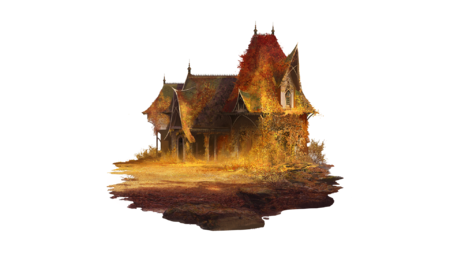
After you build your house, you can build other buildings on your Freehold. Each building needs the blueprint to start the process. If you have a cosmetic skin you want to use on a building, this is used after placing the blueprint. Once this has been placed, the building will be shown in a non-functional, construction state. Players will need to provide the required materials needed to complete the building construction, for each building on their Freehold.[4]
Freehold building skins were offered as Kickstarter and Summer crowdfunding rewards and were available in pre-order packs.[75][86][87][88][89]
- Freehold building skins can also be achieved in-game.[90]
- Freehold skins can be applied to blueprints matching the type of freehold building: housing, artisanship, and business.[4][90][7][75][76][74][77]
- Cosmetics that we have sold as part of different packs throughout the past- our pre-order system: Those cosmetics are split into three primary categories: housing, artisanship, and business; and we will have a breakdown that we're going to be releasing of the cosmetics that have come previously and which categories they exist in, but players will have the option to override the appearance of a blueprint that exists within one of those categories with an associated cosmetic skin; and that is obviously not just something that can be purchased through the pre-order system, but also can be achieved in-game as well- our cosmetics that can be applied to specific building types. And we don't get as granular where, let's say, you might have a shrine cosmetic, and you have, let's say, a blacksmith building that you wouldn't be able to apply the shrine to the blacksmith building. If the shrine exists in the artisanship lane you can apply it to any artisanship type building, but not to a house or business. so giving a little bit of additional context there.[90] – Steven Sharif
- The vast majority of cosmetic freehold skins apply to homestead buildings.[67]
- A planned feature may allow multiple buildings to be replaced by a single large cosmetic skin.[93]
- Cosmetics that are are very large in size- we will have a system that's not been developed yet, but we've been planning for this: we'll have a system where multiple buildings can be occupied space-wise by the larger cosmetic. So, a cosmetic might replace the visual appearance of one particular building, but then you'll be able to have that footprint occupy multiple buildings to replace the visual appearance. So that way you're still utilizing the similar amount of space.[90] – Steven Sharif
- Baronies won't impose any appearance restrictions on freehold buildings.[58]
List of freehold building skins
Freehold professions
- Artisan buildings on freeholds enable placement of processing and crafting stations.[67][34]
- Business buildings on freeholds allow freehold owners to provide services to other players.[7]
Processing stations

Processing stations are of course a necessary component of taking gatherables into usable crafted goods essentially to fulfill what recipes require in order to make items.[67] – Steven Sharif
We're trying to marry the visuals with what's actually going on with the station. So, if you have a job queued and you're trying to do errands throughout the node, or in your freehold or whatever, [you] should be able to look at the station and know what's going on with it: So you know he's there working and once he's done he's going to stop and you can be like, okay there's stuff ready to pick up and have some visuals associated with that. So, as much as we can have stuff rooted in world instead of throwing a bunch of UI in the player's face, that's something that we're trying to do and is important to us.[95] – Kory Rice
Processing stations are workstations that are used to process raw materials into processed goods (crafting materials) at nodes or on freeholds.[4][96][67][34][31]
- Artisan buildings are required to be placed on freehold (and node) plots to unlock placement of processing stations.[4][7][69]
- Each processing profession has four processing stations that unlock as players progress through their artisan building tech trees.[82][64][7]
- Each processing profession will have four stations; and the stations will come online as you progress through the profession. Each one of those stations will make goods that are immediately useful to the economy, to crafters, to other processors; and each processing station will build on itself and into the other stations.[97] – Kory Rice
- Master and grandmaster processing can only take place on freeholds.[7][98]
- Processing as it stands for Alpha-2's implementation is that there is a certain amount of prep work that's required first for the industry-specific component, which is the building. That prep work might be finding a certain amount of lumber to light the fire in kiln or whatever, to a certain temperature in order for you to process a certain grade of ore; and that grade of ore being malleable then into an ingot; and that produces that ingot so-to-speak. Now, in that process there's a gathering component, there's a preparatory phase, there is a time-related component.[30] – Steven Sharif
- Processing stations have queue slots that allow jobs to be queued at that station.[100] Processing jobs are processed sequentially for all players in freeholds. Processing jobs in nodes are processed sequentially per player, but concurrently with other player's jobs.[101]
- Q: Can you provide more details in regards to the design philosophy behind why it's a queue system for freeholds but not for nodes?
- A: On the freehold, processing can achieve the highest levels of processing. That's where the highest levels of processing occur. Nodes can only go up to a certain level of processing. Now we want to be able to throttle the amount of resources that can be processed at any given time in response to the fluctuation and flows of the economy. So, we want to make sure that the economy is a bigger ship when turning than being able to immediately start processing everything at once and get new resources out as the flow of supply and demand changes within the world. And because- again that's at the highest levels of processing; and you're sharing the available queues that exist at those stations. It's going to take time and it's going to take a long time for the higher level materials.[102] – Steven Sharif
- There will also be time-related and gameplay elements that require the player to interact with processing stations.[100] These elements act to throttle the introduction of processed materials from raw gatherables into the economy.[30]
- There's also possibilities that the machine you're using itself has some type of gameplay layer- should the kiln get overheated, and you have to throw some water on it or something. There are elements there in that process that we want to mimic this gameplay opportunity for players to interact; and not just be a time-sink. But time-sink is also a component of it as well, because that's the throttle for the introduction of processed materials from raw gatherables into the economy.[30] – Steven Sharif
- Processing times, yields, queue times, and job sizes can increase based on node progression, service building upgrades, node policies, and relics.[103][100][31]
- That's going to be very important as you get to very late game processed materials that are required. Because some of these things might have days to process within a station, but if you have spent the time and done the work to advance that processing station you could cut that down considerably, perhaps even greater than 50 percent; and that's going to have a significant impact on your ability to either control markets or to create goods.[31] – Steven Sharif
- Processing stations are distinct from crafting workstations that are used to craft finished goods.[98][96]
- The developers are considering a decay system for processing stations similar to item decay for gear.[72]
- Q: Do processing stations wear out over time? Do they have to be repaired?
- A: That's something that we're still discussing internally. It is coded in such a way where it's an easy variable for us to change that. There are material components that are necessary to feed the machines to keep them up and running, or it could be based on how you interact with the fuel components. If you overheat- overcharge with fuel, that can create like a system degrade similar to your armor decay, which then you have to feed materials in order to rebuild maintenance-wise. Right now it is not implemented. With that in mind, the only maintenance required is going to be through taxation. And depending on the number of permits that you have placed on the freehold will increase the amount of taxes that are necessary to be paid for the freehold.[72] – Steven Sharif
Freehold progression
Freehold progression unlocks new bonuses, abilities and capabilities for freeholds.[104]
- Freehold buildings are able to be levelled up based on the length of time and productivity of the freehold.[104]
- We want there to be progression in many systems and part of the freehold progression is that when you establish these base buildings the longer and more productive you are and exist with that freehold, the more opportunity those buildings will have to both level up: offering new bonuses, new abilities, new capabilities; and just surviving in this world is a feat in and of itself, so it's rewarded by allowing progression with those things.[104] – Steven Sharif
Business chains
There's no reason why you couldn't license your name to somebody else who also has a freehold and who also has an Inn and work together.[105] – Jeffrey Bard
Taverns
The longer a tavern is in business and the more patrons served, the faster the tavern will level up.[106][107]
- Q: What benefits do players receive for taking on the role of a tavern owner?
- A: You will get noticeability with regards to your creations because that will be displayed to the characters that consume those things; but, in addition, you can get certain types of itemization rewards depending on the number of patrons that you serve. You can also reap economic rewards, such as gold from the inn that you are selling your goods at. And then you can unlock access to certain types of recipes and or vendors based on the level of reputation you build up in that particular node.[106] – Steven Sharif
- Taverns have tech trees that allow the tavern owner to specialize and upgrade specific bonuses and services provided by the business.[108][107]
Freehold farms

Crops are intended in Ashes to be a rotational profession that is dependent on having the appropriate seedlings and/or any of the necessary tools.[110] – Steven Sharif
Freehold farms are workstation plots available for farming crops and livestock on freeholds.[111][111][112][113][24][114][115]
- Gathering and processing professions such as hunting, taming, and animal husbandry can benefit from having room for animals on a freehold.[4]
- Freehold permissions can be granted to allow other players to harvest resources on a freehold farm.[4]
- If farming and raising animals is important to you, then know that having room for this on your Freehold is a balancing act. Since Freeholds have space constraints, players will need to make choices about how much room they want to set aside for buildings, and where they want to do things like crop placement and rotation, and where to put livestock animals.[4]
- Artisan freehold features are also affected by adjacent terrain features. For example: building next to a river provides a nearby source of clean freshwater, and will have a positive effect on crops.[116]
Fisheries

You actually see there a small pond, which is actually another type of farmable area that we're going to have available on the freehold system, which is essentially a fishery so to speak. So fish play an important role from a raw gatherables a standpoint, but also again because a lot of the components of the freehold system are intended to be processing of raw materials, the fishery allows for a focus on specific type of fish gatherables that may only be gathered through the fishery blueprint.[110] – Steven Sharif
A fishery is a farmable workstation that can be placed on a freehold plot. A fishery allows gathering of fish that are unique to the fishery blueprint.[110]
Freehold security
A permissions system will enable an owner/primary tenant to grant access to specific parts of their housing.[117][118][119][120]
- Ability to open the door and enter the home.[121][119][120]
- Access to crops.[122][119]
- Ability to deposit or withdraw items from storage containers.[123][121][119][124][125]
- Permission to use furniture or crafting stations.[121]
A property has a single owner/primary tenant.[117][126][118]
- Marriage enables family size to increase by one so that housing access can be shared.[126][127]
- Access lists can be used to mimic co-ownership.[120]
- Payment of taxes may be via a "gentleman's agreement".[128]
- It'll be a single owner based system for those types of properties- for properties in general, but it doesn't prevent players obviously from collaborating and pooling resources in order to achieve certain achievements in the game.[118] – Steven Sharif
Freehold owners are able to set permissions that grant access to their artisan and business buildings' services.[4][129][35][130][7]
- Freehold ownership is designated by one account only and then the family system is the system that facilitates multiple accounts having permission basis within that freehold.[126] – Steven Sharif
- Freehold permissions are intended to work with the family and guild systems.[4][129][35]
- It is still not determined if freehold permissions will be able to be granted to individuals outside those social structures.[129]
- Freehold permissions may only apply to battalions/micro-structures within a guild.[131]
- Interaction with the guild system will be tested in Alpha-2.[132]
- This includes permission to enter the homestead, interact with furniture, access storage, interact with crafting or processing stations, and harvest resources.[4]
- Permissions to help manage your home are handled through affiliations like your Guild and family system. When setting permissions for your Freehold to do things like enter the house, interact with furniture, access Freehold storage, interact with crafting and processing stations, and harvesting gatherables on a Freehold, you can set if your Guild or family members should be able to do these things.[4]
- Permission to decorate a freehold is restricted to the owner of the freehold.[121] Previously it was stated that permission to decorate but not take anything from the house would be able to be assigned to other players.[119]
- Family members may be granted permission to apply their cosmetic skins to freehold buildings.[12]
Players cannot steal from a freehold under normal circumstances.[4][133][122][134]
- Items stored in a freehold become lootable after a successful siege against their parent node.[135][4][134] It has not been decided which players get to loot the debris field during this period.[135]
- Only players given permission to do so will be able to do things like access your Freehold storage, and harvest crops and animals on your Freehold. These permissions are capable of being individually assigned per interaction. Note that if the node associated with your Freehold is successfully destroyed during a siege event, attackers will be able to assault Freeholds, and have a chance to pillage them for their resources.[4]
Players cannot PvP while inside the footprint of a freehold homestead even if the doors are unlocked.[4][136] This does not apply for a period of two hours following a successful siege against its parent node.[137][138][139][140]
- Your home building is safe from PvP. While on the footprint of your home, you can not be harmed by damage from other players.[4]
- NPC guards may be available for hire to defend freeholds after a successful node siege.[140] NPC guards that permanently exist on a freehold are not a planned feature.[141]
- Duels may be initiated within a freehold or node as they are considered self-contained events that are opt-in by all parties, and do not fall under the player flagging system.[142]
Freehold destructibility
Freeholds may be attacked by any player for a period of two hours following a successful siege against its parent node.[137][138][139][140] Freeholds can also be lost by foreclosure for not paying property taxes or other fees.[4]
- Players and their allies may defend their freehold for this period of time.[140]
- Structures and guards may be obtained to defend freeholds during this period.[140]
- When it comes to losing Freeholds like this, one person’s loss is another person’s gain. While there aren’t enough Freeholds in the world for everyone to have one at the same time, this cycle of players losing Freeholds creates opportunities for other players to acquire one.[4]
After the two hour period of open combat following a successful node siege, any remaining freeholds will exist under a grace period for roughly 1 week where another node may take over the zone of influence of the freehold.[138][139]
- The freehold owner will be required to undertake a quest process to have their freehold adopted by a new node if one exists.[138]
- At the end of the grace period, if the freehold does not reside within the ZOI of a Village (stage 3) node or above, it will be destroyed.[4][139][138][143]
- If a siege is successful, then the Node is brought down to Level 0, and anyone who was a citizen of that Node is no longer a citizen. Freeholds within the Zone of Influence are subject to a period of vulnerability. These Freeholds can be destroyed by other players during a period of roughly 2 hours after a successful siege. Destroyed Freeholds are subject to material loss, and blueprints for them are mailed to the player to utilize for future placement in order to allow the player to keep their Freehold’s layout and structure. Once the vulnerability period is complete, any remaining Freeholds will exist under a grace period for roughly 1 week where another Node may take over the Zone of Influence of the Freehold.[139] – Margaret Krohn
- Q: How many times a year do you suspect that most players will be moving residence based on nodes being eliminated from sieges?
- A: There are a lot of variables that influence that answer. I'm not sure I can give an average, but what I would say is that depending on the political dynamic of a server: if a server tends to have more combat and/or sieges against nodes, that is going to increase the amount of opportunity for freeholds to be removed from the world and then replaced. I'm not sure I have an average. what I will say is that it is very important to remember that Ashes is not a PvP game and it is not a PvE game. It is a PvX game and that has a very specific meaning. It means that as these systems are developed as they are designed and they are integrated with each other: they are done so from a competitive viewpoint and how that system relates to both PvE and PvP. Freeholds are one of those systems very much so and it's because of the cyclical nature that we're attempting to achieve with the development of nodes and the destruction of nodes, the world is a rapidly and dynamically changing place really. So it's intended to be something that is constantly recycling and is leaking out different types of content and new content that revitalizes the player interest and stimulates new points of conflict or cooperation.[144] – Steven Sharif
Housing designs
Player housing designs and decorations are retained and can be placed again later if the housing is destroyed during a node siege.[4][145][146]
- Blueprints for homestead, business, and artisan freehold buildings, including progression and upgrades, are returned to the player.[4][139][145][146]
- A possible design idea is for items such as furnishings to be boxed in crates that are accessible inside the new home.[147]
Guild freeholds
- When a guild reaches a certain level, its guild master is granted a guild freehold certificate to enable placement of a guild hall.[148]
Underrealm freeholds
Resources will be different in the Underrealm, including unique species of fish.[149][150][151]
- This will affect professions such as fishing, farming, and animal husbandry.[149][151]
- Since players may only have one Freehold, they must choose their Artisan specializations accordingly if they wish to place it in the Underrealm.[151]
Housing types
| Player housing | Type. | Availability. | Starting count. | Limit. |
|---|---|---|---|---|
| Apartments | Instanced.[11] | Village stage and higher.[152] | 50.[52] | One per character per server.[22] |
| Freeholds | Open world.[11] | Village stage and higher.[11] | Low thousands per server.[4][25] | One per account.[22] |
| Inns | Instanced.[117] | Starting areas and Nodes.[153] | Most accessible.[153] | - |
| Static housing | In-node.[11] | Village stage and higher.[11] | 8.[52] | One per character per server.[22] |
- If you were to think about the level of exclusivity between the different types of housing that we have, obviously the most exclusive when it comes to a quantity is going to be Freeholds, followed by In-node housing, followed by Apartments, then followed by Inns.[154] – Steven Sharif
Real estate
Players buy the deeds for housing from the node itself, or may buy and sell properties from other players.[155][156][157][158][11]
- The developers are considering an auction-based method for listing new properties that become available for purchase when a node advances.[159] Currently freeholds may be acquired via auction.[4][5][6][13][7][8]
- Housing will have a base price that scales with the number of citizens in the node.[160]
- There is no cap on the price of player-originated housing sales.[161]
- In-node housing will be at a premium, and is expected to be hotly contested.[11]
- The more apartments that have been purchased in a node, the higher the price scales.[162]
- Player housing that is destroyed during a node siege can no longer be sold.[163]
- Freehold plots may be purchased from and sold to other players,[155][12] or can be obtained via deeds issued by a Village (stage 3) or higher node.[4][5][6][13][7][8][14][10]
- We're establishing a real estate market that players can invest in and then sell within the in-game economy, but also they are a resource that's subject to removal through the sieging system as well, so there's a bit of risk implied there but the idea is that this is something for players to strive for.[12] – Steven Sharif
- Housing ownership can default back to the node if the owner fails to pay their property taxes. A balance and penalties will be charged to the new purchaser of the home in the manner of a "foreclosure process".[160]
- Players will not be able to exceed their allotment of housing in the game.[166]
- Rental and leasing concepts are under consideration.[166]
Housing taxes
When a node reaches stage 3 (Village) and a player run government has formed, all player housing will pay taxes.[167]
- A player's tax charge will be determined by the number of structures built on their plot.[28][73]
- Freehold taxes are calculated based on the number of permits issued for buildings on a freehold.[4][71][72][28][73]
- Buildings that require permits will have additional upkeep costs.[4]
- Maintaining businesses requires licensing and payments to the node your Freehold is associated with. This permitting system allows for a certain number of buildings to be constructed on a Freehold. Permits can be obtained from the same node the Freehold was certified from, and buildings that require permits will have an additional upkeep cost.[4]
- Housing foreclosures result from failing to pay property taxes or other fees.[4]
Housing foreclosures
Housing foreclosures result from failing to pay property taxes or other fees.[168][4]
- Non-payment of taxes will put the housing into a default status. The player will have a period of time to settle the debt before the housing is foreclosed.[168]
- The developers are considering allowing pre-payment of housing taxes and/or allowing auto deduction of tax from a designated location, such as their personal inventory or warehouse.[169]
- Materials and resources (such as livestock) that were stored on foreclosed freeholds will be included in the auction for the deed to that freehold. Stored and placed props, such as furniture will be returned to the previous owner.[4]
- If you don’t pay taxes and other fines, your Freehold property will be foreclosed. When a Freehold is foreclosed on, stored and placed props like furniture are returned to the previous owner. Materials that were stored on a Freehold will be included in the auction for the Deed to that Freehold.[4]
- Non-payment of the game subscription will also result in loss of player housing.[170]
Visuals
2023-07-10 2023-07-08 2023-07-02 2023-07-01 2023-07-01 2023-07-01 2023-07-01 2023-07-01 2023-07-01 2021-04-15 2021-04-04 2020-05-30 2018-01-19
See also
References
- ↑ Livestream, May 29, 2020 (36:29).
- ↑ Livestream, June 30, 2023 (9:09).
- ↑ 3.0 3.1 Video, June 30, 2023 (5:41).
- ↑ 4.00 4.01 4.02 4.03 4.04 4.05 4.06 4.07 4.08 4.09 4.10 4.11 4.12 4.13 4.14 4.15 4.16 4.17 4.18 4.19 4.20 4.21 4.22 4.23 4.24 4.25 4.26 4.27 4.28 4.29 4.30 4.31 4.32 4.33 4.34 4.35 4.36 4.37 4.38 4.39 4.40 4.41 4.42 4.43 4.44 4.45 4.46 4.47 4.48 4.49 4.50 4.51 4.52 4.53 4.54 4.55 4.56 4.57 4.58 4.59 4.60 4.61 4.62 4.63 4.64 4.65 Blog: Exploring the Boundless Opportunities of Freeholds.
- ↑ 5.0 5.1 5.2 5.3 5.4 5.5 5.6 5.7 5.8 Livestream, June 30, 2023 (1:12:07).
- ↑ 6.00 6.01 6.02 6.03 6.04 6.05 6.06 6.07 6.08 6.09 6.10 6.11 Livestream, June 30, 2023 (14:09).
- ↑ 7.00 7.01 7.02 7.03 7.04 7.05 7.06 7.07 7.08 7.09 7.10 7.11 7.12 7.13 7.14 7.15 7.16 7.17 7.18 7.19 7.20 7.21 7.22 7.23 7.24 7.25 7.26 7.27 7.28 7.29 7.30 7.31 7.32 7.33 Development Update with Freehold Preview.
- ↑ 8.0 8.1 8.2 8.3 8.4 8.5 8.6 8.7 8.8 8.9 Video, June 30, 2023 (21:22).
- ↑ 9.0 9.1 Livestream, April 29, 2022 (1:03:44).
- ↑ 10.00 10.01 10.02 10.03 10.04 10.05 10.06 10.07 10.08 10.09 10.10 Livestream, May 19, 2017 (32:23).
- ↑ 11.00 11.01 11.02 11.03 11.04 11.05 11.06 11.07 11.08 11.09 11.10 11.11 11.12 Node series part II – the Metropolis.
- ↑ 12.0 12.1 12.2 12.3 12.4 12.5 12.6 Livestream, June 30, 2023 (1:15:34).
- ↑ 13.0 13.1 13.2 13.3 13.4 13.5 13.6 Livestream, June 30, 2023 (13:10).
- ↑ 14.0 14.1 14.2 14.3 14.4 14.5

- ↑ 15.0 15.1 15.2 Podcast, July 15, 2023 (11:21).
- ↑ 16.0 16.1

- ↑

- ↑ 18.0 18.1

- ↑ 19.0 19.1 19.2 19.3 19.4 19.5 Podcast, July 15, 2023 (15:14).
- ↑ 20.0 20.1

- ↑ 21.0 21.1 21.2 21.3 21.4 Interview, July 9, 2023 (19:56).
- ↑ 22.0 22.1 22.2 22.3 Interview, May 11, 2018 (50:47).
- ↑ 23.0 23.1 23.2 Interview, July 8, 2020 (45:23).
- ↑ 24.0 24.1 24.2 24.3 Livestream, October 16, 2017 (56:42).
- ↑ 25.0 25.1

- ↑ 26.0 26.1

- ↑ Livestream, June 30, 2023 (30:21).
- ↑ 28.0 28.1 28.2 28.3 28.4 28.5 28.6 Livestream, June 30, 2023 (1:45:22).
- ↑ 29.0 29.1 29.2 Livestream, June 30, 2022 (1:09:29).
- ↑ 30.0 30.1 30.2 30.3 30.4 Livestream, February 25, 2022 (1:12:27).
- ↑ 31.0 31.1 31.2 31.3 Podcast, April 11, 2021 (40:20).
- ↑ Interview, March 27, 2020 (9:00).
- ↑ Livestream, May 5, 2017 (34:15).
- ↑ 34.0 34.1 34.2 34.3 Livestream, June 30, 2022 (1:08:02).
- ↑ 35.0 35.1 35.2 Livestream, June 30, 2023 (26:23).
- ↑ Livestream, April 7, 2023 (37:56).
- ↑ Interview, July 9, 2023 (49:48).
- ↑ 38.0 38.1 Livestream, January 31, 2024 (1:24:57).
- ↑ 39.0 39.1

- ↑ 40.0 40.1 Livestream, July 28, 2023 (1:33:58).
- ↑ 41.0 41.1 41.2 41.3 41.4 41.5 Livestream, June 30, 2023 (16:14).
- ↑

- ↑ 43.0 43.1 Livestream, June 30, 2023 (1:36:52).
- ↑ 44.0 44.1 Livestream, June 30, 2023 (18:45).
- ↑ 45.0 45.1 45.2 45.3 45.4 45.5 Interview, July 9, 2023 (29:53).
- ↑ Livestream, June 26, 2020 (1:52:33).
- ↑ Livestream, May 9, 2018 (40:24).
- ↑

- ↑ 49.0 49.1 49.2 Interview, July 9, 2023 (32:53).
- ↑

- ↑

- ↑ 52.0 52.1 52.2

- ↑ Livestream, May 26, 2017 (34:21).
- ↑ 54.0 54.1

- ↑ Podcast, July 15, 2023 (6:25).
- ↑

- ↑

- ↑ 58.0 58.1 Interview, July 9, 2023 (31:18).
- ↑ 59.0 59.1 Livestream, June 30, 2023 (1:13:53).
- ↑ Interview, July 9, 2023 (22:32).
- ↑

- ↑

- ↑
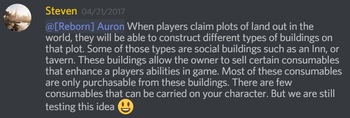
- ↑ 64.0 64.1 64.2 Livestream, June 30, 2023 (33:26).
- ↑ 65.0 65.1

- ↑ Livestream, June 30, 2023 (12:11).
- ↑ 67.00 67.01 67.02 67.03 67.04 67.05 67.06 67.07 67.08 67.09 67.10 Livestream, April 7, 2023 (31:49).
- ↑ 68.0 68.1 Livestream, May 24, 2017 (9:58).
- ↑ 69.0 69.1 Video, June 30, 2023 (15:34).
- ↑ Livestream, June 28, 2019 (1:09:22).
- ↑ 71.0 71.1 71.2

- ↑ 72.0 72.1 72.2 72.3 72.4 72.5 Interview, July 9, 2023 (54:46).
- ↑ 73.0 73.1 73.2 73.3 73.4

- ↑ 74.0 74.1 74.2 74.3 74.4 74.5 Livestream, August 28, 2020 (2:14:06).
- ↑ 75.0 75.1 75.2 75.3 Livestream, June 30, 2023 (22:05).
- ↑ 76.0 76.1 76.2 76.3 Livestream, November 30, 2020 (57:50).
- ↑ 77.0 77.1 77.2 77.3

- ↑ Livestream, May 26, 2017 (44:11).
- ↑ 79.0 79.1 Livestream, June 30, 2023 (7:36).
- ↑ 80.0 80.1 Livestream, May 29, 2020 (41:27).
- ↑ 81.0 81.1 Livestream, June 30, 2023 (1:21:48).
- ↑ 82.0 82.1 82.2 Interview, July 9, 2023 (33:55).
- ↑

- ↑ Livestream, October 31, 2018 (46:18).
- ↑ Ashes of Creation Store: Sunbeam's Remembrance.
- ↑
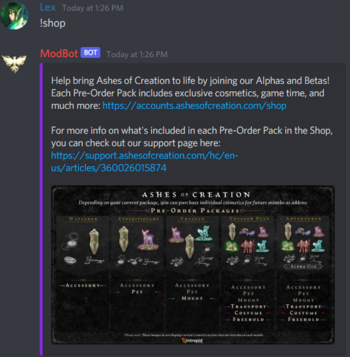
- ↑ What is included with my Pre-Order package?
- ↑

- ↑
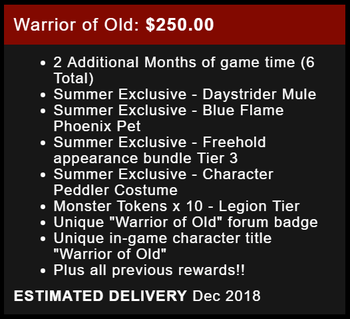
- ↑ 90.0 90.1 90.2 90.3 Livestream, June 30, 2023 (23:40).
- ↑

- ↑

- ↑ Livestream, June 30, 2023 (1:21:07).
- ↑ Video, November 30, 2023 (46:59).
- ↑ 95.0 95.1 Video, November 30, 2023 (48:22).
- ↑ 96.0 96.1

- ↑ Livestream, June 30, 2023 (37:30).
- ↑ 98.0 98.1 98.2 Video, June 30, 2023 (16:02).
- ↑ 99.0 99.1 Livestream, June 30, 2023 (38:18).
- ↑ 100.0 100.1 100.2 Livestream, November 30, 2023 (1:26:16).
- ↑ Video, November 30, 2023 (39:15).
- ↑ Livestream, November 30, 2023 (1:28:10).
- ↑ Video, November 30, 2023 (43:43).
- ↑ 104.0 104.1 104.2 Podcast, May 11, 2018 (48:29).
- ↑ Livestream, May 26, 2017 (50:00).
- ↑ 106.0 106.1 Livestream, December 2, 2022 (1:22:30).
- ↑ 107.0 107.1 107.2 Podcast, April 23, 2018 (29:56).
- ↑ Livestream, June 30, 2023 (27:52).
- ↑ 109.0 109.1 Livestream, May 29, 2020 (35:36).
- ↑ 110.0 110.1 110.2 Livestream, May 29, 2020 (39:47).
- ↑ 111.0 111.1 Video, June 30, 2023 (6:39).
- ↑ Interview, February 7, 2021 (42:41).
- ↑ Livestream, October 30, 2020 (44:22).
- ↑ Livestream, May 30, 2017 (20:01).
- ↑ Livestream, May 5, 2017 (32:11).
- ↑ Livestream, May 5, 2017 (15:47).
- ↑ 117.0 117.1 117.2 Livestream, August 31, 2023 (22:32).
- ↑ 118.0 118.1 118.2 Livestream, June 26, 2020 (58:32).
- ↑ 119.0 119.1 119.2 119.3 119.4 Livestream, June 26, 2020 (51:58).
- ↑ 120.0 120.1 120.2 Livestream, May 19, 2017 (26:40).
- ↑ 121.0 121.1 121.2 121.3 Livestream, April 30, 2021 (1:12:33).
- ↑ 122.0 122.1 Livestream, June 30, 2023 (1:19:01).
- ↑ Livestream, July 30, 2021 (1:14:33).
- ↑ Livestream, June 28, 2019 (1:23:31).
- ↑

- ↑ 126.0 126.1 126.2 Livestream, June 30, 2023 (1:24:16).
- ↑ Livestream, January 29, 2021 (1:13:04).
- ↑ Livestream, February 9, 2018 (51:57).
- ↑ 129.0 129.1 129.2 Interview, July 9, 2023 (53:08).
- ↑ Interview, May 11, 2018 (28:21).
- ↑

- ↑

- ↑

- ↑ 134.0 134.1 Livestream, May 17, 2017 (1:03:23).
- ↑ 135.0 135.1 135.2 Livestream, July 28, 2023 (1:26:16).
- ↑ Livestream, June 30, 2023 (1:49:00).
- ↑ 137.0 137.1 Livestream, November 19, 2021 (54:26).
- ↑ 138.0 138.1 138.2 138.3 138.4 Livestream, August 28, 2020 (2:04:00).
- ↑ 139.0 139.1 139.2 139.3 139.4 139.5 139.6 Blog - Know Your Nodes - Advance and Destroy.
- ↑ 140.0 140.1 140.2 140.3 140.4 Livestream, May 19, 2017 (28:04).
- ↑ Livestream, January 18, 2018 (31:05).
- ↑ Livestream, December 23, 2021 (1:29:27).
- ↑ Livestream, May 19, 2017 (29:34).
- ↑ Livestream, June 30, 2023 (1:39:22).
- ↑ 145.0 145.1 Livestream, July 18, 2017 (40:14).
- ↑ 146.0 146.1 Livestream, November 17, 2017 (47:10).
- ↑ Livestream, June 26, 2020 (1:00:57).
- ↑ Interview, April 21, 2019 (45:45).
- ↑ 149.0 149.1 Livestream, April 7, 2023 (27:30).
- ↑ Transcript, November 5, 2022 (10:46:47).
- ↑ 151.0 151.1 151.2 Livestream, June 1, 2017 (24:30).
- ↑ Steven Sharif - Clarification points from today’s stream.
- ↑ 153.0 153.1 Livestream, August 31, 2023 (15:51).
- ↑ Livestream, August 31, 2023 (18:13).
- ↑ 155.0 155.1

- ↑ 156.0 156.1 Livestream, June 26, 2020 (47:32).
- ↑ Livestream, June 26, 2020 (54:03).
- ↑ MMOGames interview, January 2017
- ↑ 159.0 159.1 159.2 159.3 Livestream, May 12, 2017 (55:01).
- ↑ 160.0 160.1 Livestream, June 26, 2020 (53:41).
- ↑ Interview, July 8, 2020 (33:34).
- ↑ Livestream, May 12, 2017 (52:01).
- ↑ Livestream, June 26, 2020 (1:02:12).
- ↑ Livestream, June 26, 2020 (56:08).
- ↑ Livestream, June 30, 2023 (1:20:20).
- ↑ 166.0 166.1 Livestream, May 30, 2019 (1:23:41).
- ↑

- ↑ 168.0 168.1 Livestream, August 31, 2023 (24:13).
- ↑ Livestream, July 28, 2023 (1:29:07).
- ↑ Livestream, May 24, 2017 (42:22).
